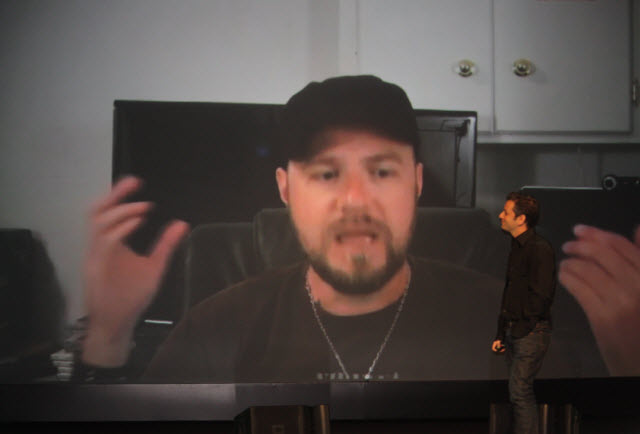 Eric Hirshberg, chief executive of Activision Publishing, talked about the role that creative people should play in making decisions about running a video game business. Too often, he said, creative people leave it to the business experts. But creative people shouldn’t sell themselves short, as Hirshberg learned in the last 18 months running the division that includes Call of Duty franchise.
Eric Hirshberg, chief executive of Activision Publishing, talked about the role that creative people should play in making decisions about running a video game business. Too often, he said, creative people leave it to the business experts. But creative people shouldn’t sell themselves short, as Hirshberg learned in the last 18 months running the division that includes Call of Duty franchise.
With the launch of the latest Call of Duty: Modern Warfare 3, Activision Blizzard (the parent company) made some controversial moves. One of them was to create the Call of Duty Elite social networking service for game fans. The service offered things like networking with friends, videos, service enhancements. But the controversial idea was that Activision wanted to charge a subscription fee for the premium version of the service. When bloggers heard about that, they revolted, Hirshberg said, because they thought that Activision would charge for things that used to be free.
“It’s a douche move,” said Neils Hansen (pictured on big screen below), a blogger who runs the Gunn Shop report on YouTube. He said he couldn’t believe that the company would alienate its core gamer base by charging money. He organized a protest to boycott the Elite service, even before he fully knew what it was.
“We had a summer of criticism,” Hirshberg said, speaking at the DICE Summit game conference in Las Vegas.
But Hirshberg said he believed from his creative background as an artist and advertising executive that games are not products, they’re brands. While people buy products, Hirshberg said, they “buy into brands.” That means that brands are a cultural phenomenon built around products such as games that inspire people to buy those products over and over again. By treating Call of Duty as a brand, Hirshberg said, the company could get away from the traditions that held that a game was a product that sold for $60. After all, in 2011, Call of Duty was a top ten topic of conversation on Facebook; it was the only entertainment brand with a product you could buy on the list.
To convince game players that there was a core Call of Duty experience, Activision created a campaign with the tag line, “There’s a soldier in all of us,” showing people of all sorts engaging in faux combat, as the weekend warriors who play games like Call of Duty. The company also created a service that players could buy into on a year round basis, delivering them new map content, vidoeos, shows, contests, and community features that could make Call of Duty into an ongoing experience, not just a product.
The company had a chance to turn around attitudes by appealing to the hardcore fans and the culture of Call of Duty. Activision then announced Call of Duty XP, a live event in Los Angeles where it would announce Modern Warfare 3 and Elite as part of a gigantic fan appreciation event. The event involved everything from paintball on a real Call of Duty map to eating at a Burger Town restaurant, which is a fictional chain in the Call of Duty games. The event was a huge success, generating $21.5 million in media impressions, 175 million Facebook impressions, 10 mil Twitter conversations, 9.8 million YouTube views, and huge livestream traffic.
Finally, at the Call of Duty XP event, Hirshberg revealed the price. It was $4.99 a month and it included all of the map packs that would normally cost gamers about $60 a year. It was a price that generated annual subscription revenue for the company. And Hansen, the Gunn Shop blogger, came back and said that he would eat his words and subscribe. It wasn’t, after all, a douche move. Activision could only accomplish something like this by establishing Call of Duty as a brand, guaranteeing gamers a unique experience, and getting the gamers to buy into the value of what it offers, Hirshberg said.
Elite had a rocky launch and it is far from perfect, he said.
“This is not a victory lap and we had technology stumbles,” Hirshberg said.
But the company has 7 million sign-ups and 1.5 million paying subscribers so far. That’s a success, and one that forced Activision to look to what it could learn from creative concepts, not just business ideas. The new tagline for Elite, Hirshberg joked, is, “Call of Duty Elite. It’s not a douche move.”
VentureBeat's mission is to be a digital town square for technical decision-makers to gain knowledge about transformative enterprise technology and transact. Learn More

